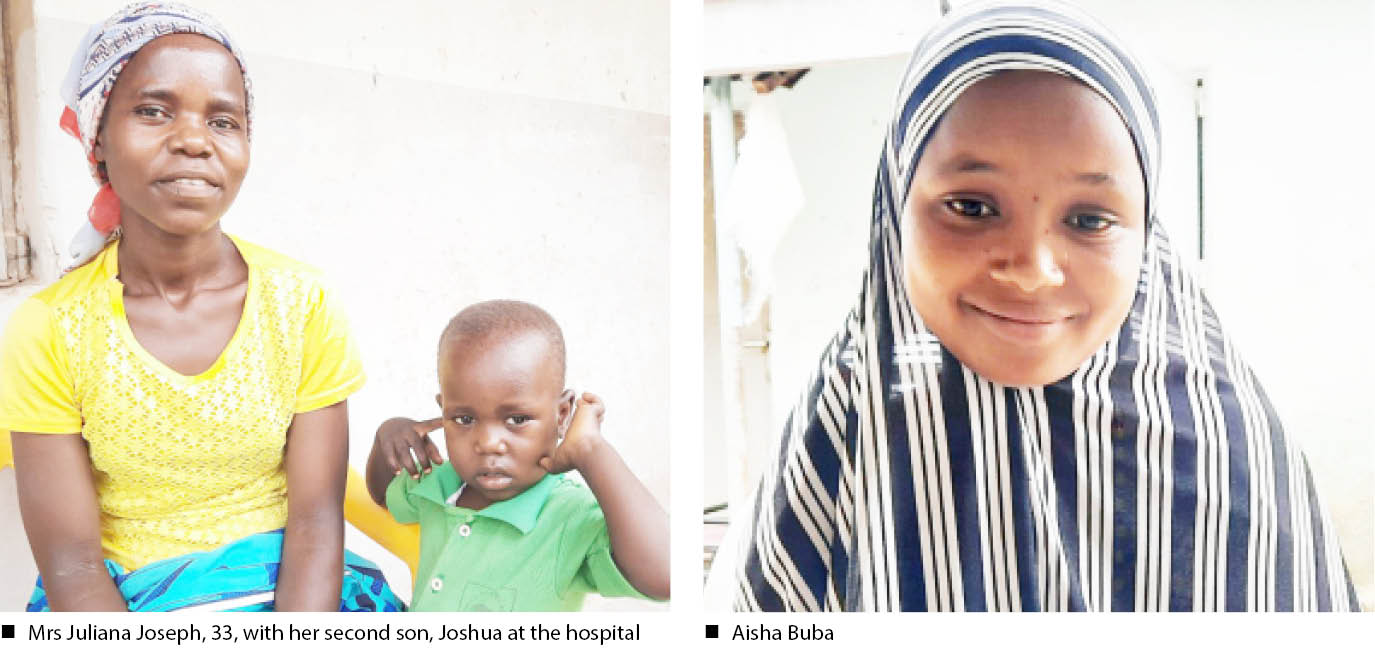Seated on a plastic chair in the backyard of the Maternity Ward of Saint Lukes Hospital, Gombe was a 16-year-old girl, Aisha Buba.
She was deep into thinking looking at the sky, the teenager was recuperating after she underwent surgery and was treated for Vesico Vaginal Fistula (VVF).
- I won’t allow vacancy in traditional stools beyond 2 yrs — Fayemi
- Crisis hits Tuface’s family as wife attacks him publicly
Young Aisha was brought to the hospital with a fistula problem from Damchuba village of Kwaya Kusar Local Government Area of Borno State.
The teen bride conceived her first child when she was barely 14 years, having been married at a tender age of 13, to a 21-year-old herdsman.
Young Aishatu and her husband live in a remote village located some kilometres from Biu LGA of Borno state.
Living in an agrarian community, she has to help her husband on the farm and also look after the herd of cattle, in addition to other house chores.
As such, the hard labour Aisha was subjected to and lack of antenatal care, she miscarried the first baby after returning from the farm.
However, about a year after the miscarriage, young Aisha conceived again and nursed the pregnancy for nine months.
When she started labour, an unskilled Traditional Birth Attendant (TBA) was invited to deliver the baby, but for over 24 hours, Aisha was in pain and couldn’t deliver the baby, thereafter it was decided that she has to be taken to a hospital.
She was first taken on a motorcycle to the roadside, where they boarded a commercial tricycle to General Hospital, Biu, where a Caesarean Section (CS) was conducted on her.
Unfortunately, despite the pains she was subjected to, the young expectant mother lost the child and also developed a fistula, a disease associated with the frequent flow of urine that mostly affects young women who got married at an early age.
Following the incident, Aisha spent the next seven months at her parents’ house moving with catheters. She also faced stigma from her peers because of the foul smell, resulting from the frequent flow of urine.
Sitting beside Aisha was her mother, a 33-year-old Malama Khadijah Buba. The mother too was married at 14 years. She now has five children, Aisha being the first child.
According to Khadija, even though there is a primary school in their village, none of her children was enrolled in school. “The boys look after our cattle, while the girls sell milk at the nearby markets and we marry them off when they reach 13 or 14 years.”
Aisha’s neighbour in the Maternity Ward, Mrs Juliana Joseph, 33 from Bambam town of Balanga LGA of Gombe State also shared the same fate.
Mrs Joseph also developed the VVF when a CS was conducted on her when she delivered her first child, 10 years ago.
“I was in labour from Sunday in the afternoon until the CS was conducted on me on Monday around 12 am at a Primary Healthcare Centre in Bambam, and that was how I got the fistula.
“We have visited the hospital in Maiduguri, where a surgery was conducted on me but it wasn’t successful and I was asked to pay again, having spent over N 56, 000 earlier, my husband couldn’t afford the second payment, so we had to abandon the medication and return home.
According to her, after some years, her husband who works as a private security guard was able to raise another N40, 000 and was admitted to the Federal Teaching Hospital (FTH), Gombe.
Juliana added that “after several tests were conducted, the doctors revealed to us that the first doctors that conducted the first surgery had further damaged my urinary track, that I need another surgery.”
Due to financial constraints for another surgery to correct it, she resigned to her fate and went back home, “Where I faced a lot of stigmatisation from people of our village.”
“We later relocated to a village near Abuja with my husband where he was engaged as a security, I conceived the second child and I delivered it successfully. I delivered another child while having the VVF.”
However, Juliana and her husband got a reprieve when the Evangel VVF Centre, Jos, Plateau State arrived in Gombe for a one-week medical outreach for VVF patients.
She and her hospital bed neighbour, Aisha Buba, were treated free of charge alongside 19 other patients during the free surgery and treatment of VVF patients by the Evangel VVF Centre.
The Project Director of the Centre, Dr Sunday Lengmang, said during the one-week outreach, they had conducted about 21 successful surgeries for the VVF victims.
He said about 80 per cent of them are complex cases, which they were able to conduct at the hospital in Gombe during the outreach.
“Initially we had to transfer the patient to Bingham University Teaching Hospital in Jos, but with the newly acquired equipment, we were able to conduct all the surgeries here, which saved us a lot of stress and cost.
“Among the victims was a one-year-old girl who was born with the problem, which we called congenital, a surgery was conducted and she was treated and discharged,” Dr Lengmang explained.
According to him, due to the high number of VVF patients and the high cost of the treatment with low funding, they are now focusing on preventive measures to curtail the problem.
He said: “To treat a single case cost between N150, 000 to N300, 000 and we are doing it absolutely free of charge. Due to lack of funding, we are now focusing on preventive measures.
“Some of the measures are; training of healthcare workers to enlighten the pregnant women on causes of fistula and how to prevent it. We also trained champions. These are patients who were successfully treated and discharged to enlighten their fellow women back into their respective villages.
Dr Lengmang added that they are also engaging traditional and religious leaders to talk to their subjects on how to prevent fistula.
The director added that in the next phase of the project, they will introduce rehabilitation as part of the treatment. “That is, the livelihood and rehabilitation component, which is to empower the women to be able to access hospital service after the surgery.
“We would visit them to see how they are re-integrated into the community to look after their socio-economic well-being. To give them a soft grant that they can start a trade and start a living.
“This is another prevention method, because, without financial strength to access the hospital services, they may not be able to access care back to the previous condition. Because we strongly encourage that after surgery for fistula, the patient should not deliver though normal delivery but through CS.
“But without fund and financial stability that won’t be possible, so they may go back to their previous condition,” he concluded.
North East Trust learnt that a lot of women, especially in the rural areas, are silently living with the fistula, but lack of access to treatment forced them to live in isolation with stigma.

 Join Daily Trust WhatsApp Community For Quick Access To News and Happenings Around You.
Join Daily Trust WhatsApp Community For Quick Access To News and Happenings Around You.


